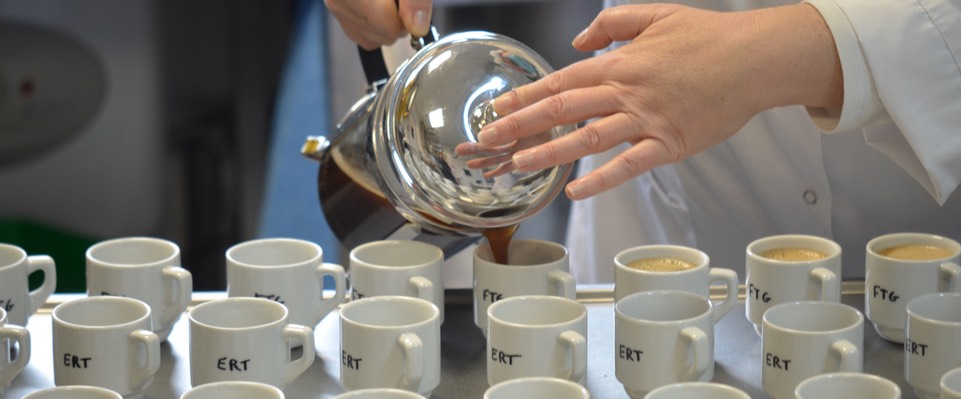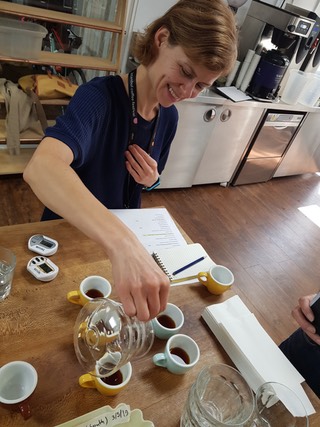
Podcast: Play in new window | Download (Duration: 18:58 — 17.4MB)
Subscribe: Google Podcasts | Spotify | Android | RSS | More
 A little less than a year ago I talked to Professor Jeremy Haggar about his search for a forgotten coffee of Sierra Leone. It was a species called Coffea stenophylla, named for its narrower than usual leaves, which had an extremely good reputation a hundred years ago. Unfortunately it was not very productive and so, despite its excellent flavour, it was shoved out by much more productive robusta coffee. After quite a search, Haggar and his colleagues found a few plants, probably not more than 100 in total. Although they were delighted to have rediscovered stenophylla, they were disappointed that there were no coffee berries on the bushes.
A little less than a year ago I talked to Professor Jeremy Haggar about his search for a forgotten coffee of Sierra Leone. It was a species called Coffea stenophylla, named for its narrower than usual leaves, which had an extremely good reputation a hundred years ago. Unfortunately it was not very productive and so, despite its excellent flavour, it was shoved out by much more productive robusta coffee. After quite a search, Haggar and his colleagues found a few plants, probably not more than 100 in total. Although they were delighted to have rediscovered stenophylla, they were disappointed that there were no coffee berries on the bushes.
In early 2020, a colleague returned to the rediscovered bushes and gathered a handful, literally, of fruits. Then came covid, and efforts to taste the coffee stalled. In the meantime, prompted by the rediscovery, the French agricultural organisation CIRAD decided to take a closer look at the C. stenophylla on its research station on the island of La Réunion in the Indian Ocean. They gathered a slightly bigger handful, maybe half a kilogram, and both sets of coffee beans have now been appraised by experts. Just last week the researchers published their conclusion: “we are able to corroborate historical reports of a superior taste”.
For this episode I spoke to Jeremy Haggar again to catch up on the story and what it means for the future of coffee and the future of Sierra Leone.
Notes
- The original episode with Jeremy Haggar is It’s coffee, but not as we know it.
- If you are in the UK and interested in good coffee, the outfit that micro-roasted beans from the Sierra Leone is Union Hand-Roasted Coffee
- Here is the transcript.
- Banner photo by CIRAD, others by RBG Kew.

“This stenophylla sample … was something distinct and unique, and everybody agreed they had not really tasted quite the likes of it before.”
@JeremyHaggar on this rare #coffee, from the transcript now available at eatthispodcast.com/stenophylla/
It will be good to have your thoughts on the matter.
by which i mean both Jeremies of course.
Recording imminent – but will make sure I listen to Jeremy’s wisdom first!
Looking forward to the final (?) episode of @FilterStories and @coffeehistoryJM on specialty coffee. I wonder whether they will have anythi
Looking forward to the final (?) episode of @FilterStories and @coffeehistoryJM on specialty coffee. I wonder whether they will have anythi
A full update on the great quality proven for Coffea stenophylla and potential implications for the future of coffee in my interview @NRInstitute @KewScience @Cirad
That was a fascinating find! I want to how many new solutions will pop up to help coffee survive climate change…
Seems like it’s probably worth recapping the whole new-species-will-save-your-morning-coffee-from-climate-change story that’s been going around.
It all started last year with a paper describing the re-discovery in the wilds of Sierra Leone of a species of coffee that used to be very well liked but then fell out of favour due to low yields. It’s called Coffea stenophylla1 and of course Jeremy did a podcast about it, interviewing one of the authors of said paper, the very engaging Prof. Jeremy Haggar.
Fast forward a year and we now have a follow-up paper assessing the taste of coffee made from beans C. stenophylla from that wild population in Sierra Leone and also from a CIRAD research stand in La Reunion. And guess what? It’s really good. So of course Jeremy went back to Prof. Haggar for another nice chat.
C. stenophylla grows in hot and humid lowlands, so it’s a little more ready for climate change than your average arabica. Still, the yield issue is presumably still there, and no doubt other problems will arise, as they always do. But I’m keeping my fingers crossed, because I really want to taste the stuff — and boost Sierra Leonean business along the way.
Oh and of course we’ll have to revise the global coffee diversity conservation strategy now…
There is only one entry in Genesys, from CATIE. [↩]
“Unfortunately (Coffea stenophylla) was not very productive and so, despite its excellent flavour, it was shoved out by much more productive robusta #coffee.”
Latest episode goes a little deeper into the story of the rediscovered forgotten coffee of Sierra Leone.
eatthispodcast.com/stenophylla/